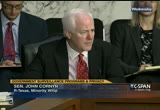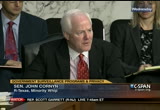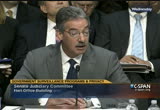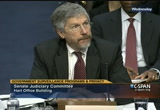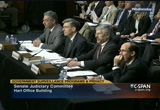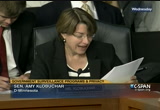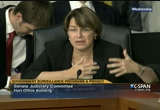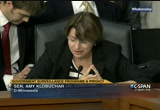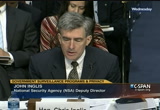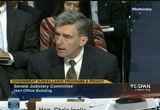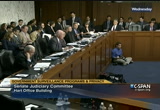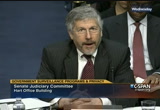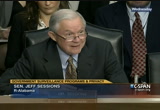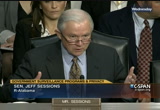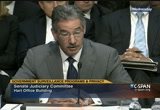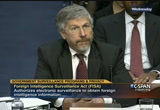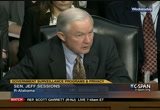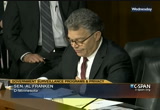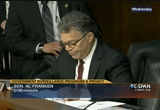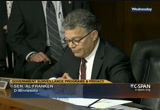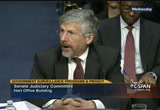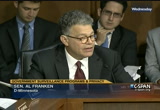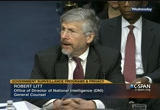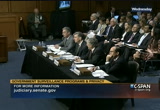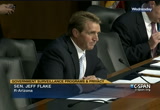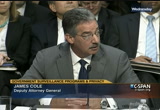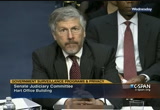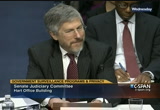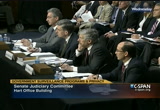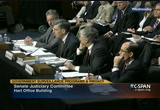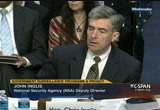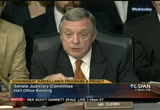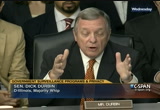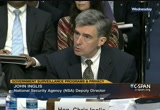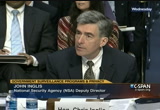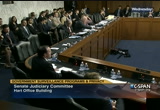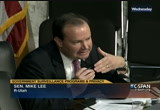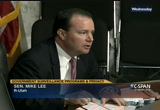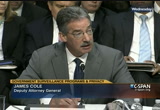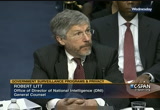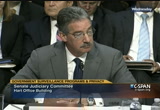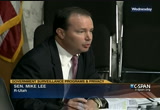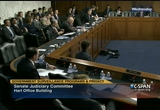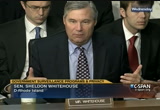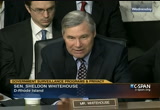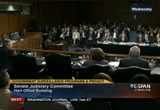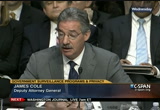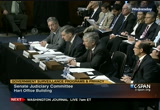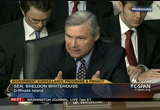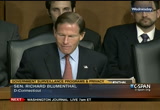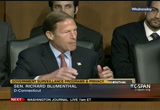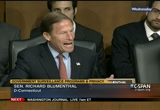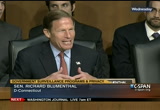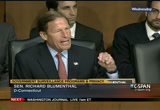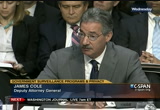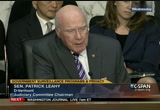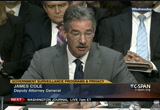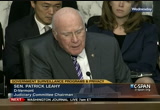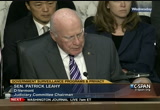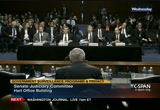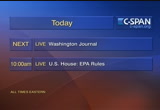tv Capitol Hill Hearings CSPAN August 1, 2013 6:00am-7:01am EDT
6:00 am
individualized warrants, it is common in our system to have essentially ex parte proceedings but here, when the foreign intelligence surveillance court is authorizing a program, it is, according to judge robertson, under this expanded jurisdiction, it is turning the court into an administrative agency. and of course, talking again about public confidence which is an important part of maintain that confidence, whether you think there might be some advantage, as senator bill mccaul and i have discussed formally, having more of an adversarial process. i trust your experience with the adversarial process in our courts usually produces more information that allows the judge to make it better decision.
6:01 am
i would like to get your reaction. >> thank you center. -- centaur. i can tell you that we have had far more than another administrative agency. they push back hard. they make sure that they are the guardians of the law and the constitution. having an adversary and there is worth having a discussion about. it is being discussed in the senate and house. it is one of those areas that i think is part of the debate that i think we should be having about how to do this. there are issues that we will have to work through. ference is in classifications. who will be there and their role be. things of that nature. these the type of discussions we need to have. as you pointed out, it is not the usual course. in the criminal law context, we have many search warrant's and title iii surveillance warrants the common that are not part -- that are not done in an adversarial way. this is part of what we would
6:02 am
like to be doing and would like to see this has some utility. >> do you have any to add? >> my background is informational. i have an obligation to ensure these things are done in a way that is consistent with the constitution. we welcome any any and all hard questions. we enjoy the process. we think that we should be held accountable to these questions. we could do we need to support the whole of the constitution. not just the defense of the national security, but the defense of civil >> the point i would like to make, from the perspective of the intelligence community is, this is unusual process. thecourt is involved in conduct of foreign intelligence. nationt know any other in the world that has the degree of overseeing that this nation has already. able make a mistake and analogy
6:03 am
when they hear the term court and of this as an avid serial receding. the question is, what is the best way to ensure that our intelligence programs are conducted in compliance with the law? if it would help to have an avid serial process built-in, that would be worth doing. we should not make this a criminal trial. it is a different process. >> my background is that -- is informational. -- operational. i will defer to the lead attorney. >> thank you. i hope that we have something that can collect data on u.s. citizens and you are not saying that the courts should not be
6:04 am
involved. >> thank you very much. i'm not saying that at all. tothank you very much and our witnesses. as a former prosecutor, i have believed that our laws must strike the right balance between protecting our civil liberties and our national security. i think that most americans will say that they did not expect the sweeping nature of these surveillance programs. for that reason, i think this opportunity to re-examine these programs to make sure that they are more transparent without sacrificing the benefits they make to national security is very important. i just got this course order that is hot off the presses. metadata,hat the which i assume is the collected data that we have been hearing about on domestic phone calls, not the phone conversation itself. then we going to a second
6:05 am
category when you are investigating parts of that metadata. that is based on this order. this is category three. this is when you get a court order to investigate a person. is that a fair way to look at this. looking at this. looking at this. the only thing we are involved in surveilling are smaller groups that we have reasonable suspicion for. we are not surveilling everything that is in the database. you have to go to the specific requirements. bethere would have to reasonable suspicion that there is a terrorist. >> reasonable suspicion that it is relevant to an investigation of certain terrorist organizations. >> is there a percent of that data that you look at when you
6:06 am
are getting to the big meta- data and go down to the next category. what percentage of the data is the next category. >> it is hard to quantify. i've heard anything from 0.0001%. it is a very tiny fraction of the metadata. >> we are down to the part where you are looking in. >> that is even smaller. we have to have probable cause to believe that those people are falling within the requirement of the foreign intelligence surveillance act. >> is there no way of limiting the program that would not have adverse effects on our ability to monitor national security threats? >> this is what we're looking at right now. as chairman feinstein noted, she has made some recommendations and we are in the process of looking through that to see if there are other
6:07 am
ways of going about doing this where we still preserve the effectiveness of the operation and limit whatever intrusions come from that. >> i know one idea that general out xander suggested is the idea telecommunication companies holding the records, rather than the nsa. as long as the government could get access. do you want to testify about that? is that a viable alternative? >> there are multiple implementations that could work. with that the score that against what we've seen at the top. we need to have the ability to, if you ask a question of the database where you have reasonable suspicion about a
6:08 am
plot against the homeland, you want to check to see if there is a connection to the homeland. you need the brass within the database. when you get a response, you have found it in any particular location in the world. the breadth is important. so long as you do this in a timely way. --need to disrupt and from an operation that is in progress. there might be situations where you have time to take more time. we will have to think through whether or not our providers to meet that standard. finally, to the question that senator feinstein asked, our experience has shown that our intelligence, writ large, has a
6:09 am
tail-off after five years. when you take a hard look at that and determine how long these things are necessary and be on that, how long these are valid this is been classified. >>is there an effort underway to declassify some of the legal rationale we're trying to get get as much as we can out of the nationals in purity concerns of those releases. >>our goal is to have as much information as we can. methank you very much, let ask this. >> thank you all very much. bestwith regard to mr. joyce's comments about dealing with the thing that you could interdict and stop.
6:10 am
the collection of data under this program played a role in the culmination of that case. youamentally you are a -- are a deputy attorney general under janet reno for six years you are the member of criminal justice. used ids issues using that as -- you have studied this issue. has this violated because it using it anyway by defying u.s. >> and the constitution? >> thank you for the promotion, i never served as judy attorney general. attorney general. i had a couple positions. >> i have a hard time keeping all the deputy assistant straight. i just want to raise a certain
6:11 am
point. >> we can all agree he is highly qualified. >>i think the answer is under the controlling case law that the collection of this kind of telephone metadata from the telephone companies is not violating anyone's constitutional rights. >> when as a federal was autor, -- when i federal prosecutor you are a federal posterior. ,this complex case resulted in a subpoena to phone companies. is that correct? >> i would say vast majority required phone records. >>when you did that, you would get a lot of details about the call, but not the contents of the call. >> you can get the subscriber information. once the phone and things of that nature. -- who owns the phone and billing addresswe do not get that under this program. >> this haystack of information
6:12 am
is only numbers. it does not have the name of the person connected to that number. is that correct? isif we find a thing that important, we had to do other investigations to find out who belongs to those numbers. talkedirman and others about, when the patriot act was passed, we went into great detail about this issue. i would say that balancing the constitutional rights of danger versus constitutional rights is not the right way to phrase this. i believe that everything in the patriot act at we passed was consistent in principle with the things that have been done by law enforcement for years and decades, in terms of the ability to issue subpoena and obtain the records. there are a few new applications of its two new
6:13 am
technologies. essentially, the principles were maintained. would you agree? >>lex yes. i think that we have struck the balance properly. there is always room for discussion and getting people's inputs. sometimes, we revisit these things and make sure that we get a balance right. >> i agree with that. this haystack of phone numbers, there is no ability to listen to any of these conversations that occurred, is there? >> no. we do not capture these conversations. there is no ability and no possibility of listening to conversations. lawyer, intelligence you had the ability to tap a
6:14 am
terrorist phone call in yemen. that person calls into the united states on a lawful wiretap, do you listen to the call? is that right? a wiretap listens to the conversation that the bad guy has with whoever they call. >> that is correct. under pfizer, the court requires us to have minimization procedures to make sure that we do not disseminate the communications of americans unless they are evidence of a crime or valid foreign intelligence. a if you want to tap terrorist in the united states, you have to have a warrant with probable cause, do you not?
6:15 am
>> that is correct. >> if you identify a person by surveilling a foreign terrorist, you still have to have information sufficient to get a title iii warrant to listen to that person's phone calls. >> they could be a title iii warrant or an individual warrant. either way, there is a relevant probable cause standard that has to be met. has know this committee worked hard on this. we have tried to make sure that every provision in the act was consistent with our constitution and legal heritage. we will listen to the concerns that are being raised. if we have made a mistake, i am going to change it. i'm inclined to think that all of these things are consistent with the constitution.
6:16 am
weone of the reasons that are having this hearing is that there are going to be proposals for changing the law. i want to make sure we have as much information as possible. >> thank you mr. chairman. i want to thank all the witnesses for their service to the country. >> i want to be clear at the outset, these programs protect our country and save lives. i think there is a critical problem at the center of this debate. that is the lack of transparency around these programs. the government has to give proper weight to keeping america safe from terrorists and protecting american's privacy. almost everything about these programs is secret. the company is involved under strict gag orders in the american public has no way of knowing whether or not we are gain a balance right.
6:17 am
-- we are getting bad balance right. that is bad for privacy and bad for democracy. tomorrow, i'm introducing a bill to fix this. it will force government to disclose how many americans have had to information collected under the key authorities of the foreign intelligence surveillance act. it will force the government to disclose how many americans have had the information reviewed by federal agents. my bill would allow private companies to disclose aggregate figures about the number of pfizer orders that they are receiving and the number of their users that these orders have affected. two weeks ago, a broad coalition of 63 internet companies and bipartisan civil liberties groups sent a letter to the president asking for reforms that my bill would make law. i'm proud to say that i am introducing my bill with the support of chairman blakey -- leahy.
6:18 am
senator feinstein and i might have some overlap in our purchase. -- in our approaches andi will be happy to work with her. i like to focus my questions on transparency. in the weeks after mr. snowden's leaks, the office of the director of national intelligence decide to declassify the fact that in 2012, 300 queries were run on the database of records under section 215 of the patriot act. can you tell me why this fact was declassified? >> to be cleared, what was declassified was the fact that there were fewer than 300 telephone numbers approved for queries. there can be more than one query, based on the same
6:19 am
telephone number. for example, over time, you can check. and see whether there has been additional communication. that was declassified was the one under reasonable and articulable suspicion. >> why did you decide to declassify the fact? the are looking at all information surrounding these programs. what has already been revealed. fundamentally, these programs were declassified to begin with because revealing our capabilities would give our adversaries and edge in how to avoid these abilities. once these programs became public, we listed at all the details around these programs. we are making assessment to each one of them to make sure that it is in the public interest to release that fact that has been declassified.
6:20 am
-- which has previously been classified. >>i think that -- i do not want the public to take our word. i think there's a balance here. transparency is part of that balance. i do not want a situation where the government is transparent only when it is convenient for the government. >> i think -- >> about an hour ago, there is a revision to section 215. for weeks, they knew this hearing was coming. they release his before the hearing began. again, it is a step forward, but you get the feeling that it is ad hoc transparency. that does not engender trust. >> i cannot agree with you more. we have in the -- an obligation to look at the bad and the good and declassify what can be declassified without danger.
6:21 am
we had a discussion within the executive branch about whether or not we should release these documents is morning or not. is generally not a good idea to release things on the morning of the hearing. he came to the conclusion that when we had made the determination that the documents should be declassified, there is no justification to hold them up. >> did you just are about that decision yesterday? your known about this a long time. you might have thought about this weeks ago. instead of, the day of. >> we have been processing the's as quickly as we can. they're things that remain classified. interagency process.
6:22 am
to reach consensus on what can be released. >> my time is up. i think that we should create a strong permanent set of public reporting requirements that will empower the public to recent own conclusions about the merits of these programs. that is with the bill i am working on will accomplish. i love to work with senator feinstein. i would love it if you would work with me to make sure that we get the reporting requirements right as we move forward with the bill. would you do that? >> absolutely. i would be glad to do that. >> i want to comment all for the witnesses here for their candor and on one at single out mr. inglis. i have been advised that you have always been clear and straightforward. classifiedis in sessions.
6:23 am
opener, that is in sessions. i appreciate that. >> i'm sorry i was not here to hear your testimony. i know you have all noted in your written testimonies that there are checks within the fisa system. do you believe that there are insufficient checks to outweigh the concerns that some have about the appointment of an independent counsel? if you have touched on this in earlier questions, i apologize. you mention this with regard to independent counsel. in the second panel, mr. baker raise concerns with the independent counsel. can you give me your thoughts about whether or not it is needed? >> this is a topic being discussed within the administration and congress as one avenue that might be available. traditionally, when you issue search warrants and wiretaps,
6:24 am
you do not have an absurd a process that takes place. -- an adversary process that takes place. there's not someone on the other side. there is a legal tradition that the way we have been doing it is one that we have done in other context. we have a court involved. that is unusual, as it was pointed out. --iculously within a foreign particularly within a foreign intelligence context. to have the courtsthis is something that we are involved at all. open to having discussions about. what the utility and the role would be. how would work. the devil could be in the details. all of these things are worth discussing. to figure out how to make this the best program it can be. >> if there was an independent counsel involved, would there be problems of timeliness? would you have staff cleared to review sensitive information if others wanted to address that?
6:25 am
little bit. thecore pushes back -- court pushes back itself. we make sure that we satisfy all the requirements under the law and constitution. and there's someone on the other side, i would would imagine they do the same thing on the same schedule. >> there is a letter that the chief judge of the foreign intelligence surveillance court has written to the chairman. it is available on the internet and outlines, in some detail, the procedures that the court has followed. it indicates the care that the fisa court has followed. about the process that we have in the selection of these judges. and may lead to more republican judges being appointed then democrats. do you sense or see any
6:26 am
difference with -- with -- is that an issue that people should be concerned about? >> from my experience, i have not seen any decisions that are being guided by politics. thatis certainly a topic we would be to the sound discretion of congress. >> other thoughts? >> any problem with the process of selection of judges? >> it is hard to tell how another judge would have rendered the decision. you only have the one judge rendering the decision. >> thank you. >> thank you. i'm a liberal arts lawyer. i took some courses but it has been a long time ago.
6:27 am
i'll ask the panelists to help me do some math. in 2012, there were 300 questions that resulted in a search of records. we are told that there are three hops. in other words,if i was the subject matter of the search and i called senator feinstein, they would evacuate all the records of my telephone calls. the records ofll my telephone callsand all of the telephone calls of senator feinstein. it may include chairman leahy. willennifer, of the aclu, testify and speculate later that if i had 40 contacts, that would mean that for my name, you would accumulate 2 million phone records.
6:28 am
2 million. for one inquiry. multiply that by 300. we're talking about 600 million phone records. multiply that times seven years. what has been described as a discrete program, to go after people who would cause us harm, when you look at the reach of this program, it envelops a substantial number of americans. can somebody help me with the math here question mark have i missed something along the way the way? >> i would be happy to follow up in any detail that you'd like. first and foremost, analysts are charged with providing information that is useful. in that regard, they try to be
6:29 am
judicious about choosing when to do a second or third hop. those are always exercised. they do not always exercise a second half for all numbers provided by the first top. theoretically, 40 times 40 times 40 get you to a large number. what we see, for example is that the second hop, there are significant numbers that are associated with that number. it will have to come with something that you glommed onto. you do not want to pursue a pizza delivery man. that is not useful. if, on the second hop, you see it is linked to a number that is to a known terrorist, you want to make a third hop. >> i understand that part. we're trying not to waste the time and resources of government. the reach of this goes beyond 300. but that is an important question. we have to compare the theory to
6:30 am
practice. >>the reason we declassify the numbers is to show that we are judicious. only 300 times it we use a selector for query. >> if i can add one thing, it is important to remember that all we are getting out of this is numbers. nobody's name, nobody's address. this is a tool to identify health phone numbers. -- telephone number is that warranted -- that warrant further investigation. >> i understand that. here is what i offered to a committee that garnered four votes. on this very subject because this to 15 program in detail. i knew more than some. not as much as i am learning today. there is concern today. limitedtime, he cousin
6:31 am
-- because of the limited knowledge of the members, i got four votes. this is the question i get down to --if my cell phone is an area code 217, which it is, and i am a suspect, i think is appropriate and eying courage my government to find out why i'm talking to. that is important will stop i cannot get to the point where i required everyone who was a 217 area code to have the records collected. multiply that across every area code in america. look at the potential reach. it seems to me that what is being described as a narrow program is, in fact, a broad program. what i would like to ask is, we have saved lives with this. the 215 program has saved lives. good. that is what we want our government to do. could we have saved the same
6:32 am
amount of lives if, knowing my phone number, as a suspect, you could search my records as opposed to everyone's records in my area code. >> i think that is a great question. what we knew only made this query was that we had a reasonable suspicion that this was affiliated with a terrorist plotting against the homeland. this was associated with al shabab. in somalia. we need to do where he -- query. -- we had no idea what it would have been associated with. we do not know what area code it would be. we do not know the set of possibilities. and were defined the needle, -- in order to find the needle, we
6:33 am
needed the haystack. before we made that clear he, -- not know. >> this operative, you can go after this person and his telephone records. and all of the contacts that this person has made. the question we are faced with is, you need five years worth of data on everyone in america so that the haystack -- which is pretty big -->> that is a fair question. bethe future, it may well that the plot occurred in the past. if you do not have the past records you cannot determine -- >> that is -- it would require the -- require the fund, is to retain the
6:34 am
records -->> that is a fair point and it is possible. not be under the access of government? >> i agree. >> under the current legal framing -- >> how hard would it be? i do not think it would -- i do not think it would be hard. don't think so either. >> you have to think of the rest of the attributes to make this a proposed venture. >> senator feinstein said to ask him about the expense. >> within classified session, i can give you chapter and verse about the expense. the expenses are different. depending whether you choose the current implementation or not. the government requires the providers to retain the records to share the expense. >> thank you. nsa'srstand the collection of metadata -- the kind of metadata that we have discussed today -- is accomplished under 215 of the patriot act. section 215 faces an important
6:35 am
limitation on the collection in that it limits the government's ability to collect the metadata. it has to be relevant to an authorized investigation. at some point, relevance is a concept that is difficult to define in the abstract. it is a fluid concept. it is something that a jurist might say, i know when i see it. they struggle to define it. even though it may be difficult to define, in the abstract, what relevance is, haven't we left the station of relevance ofore we get to the point collecting metadata for 300-- americans?
6:36 am
and there cellphone usage? how can you get your mind around that concept of all that information being relevant to an ongoing investigation? >> senator, it had been noted how broad the concept of relevance is in civil discovery and many different legal contexts. leadn be things that can you to things that you need. >> right. i understand a broad conception of relevance that was explained at the brookings tax -- at the brookings institution. there is no context, and civil discovery or otherwise, where one could justify taking in information about each and every single american who owns
6:37 am
a telephone. >> the answer i would give you, senator, is that we are not accessing, or getting into all of the metadata. we do not get to look at it until our heart is content. you have to look at it within the context of the primary order that was declassified today. it says that the only way you can access it is it you have a reasonable and articulable belief that this is related to specific terrorist groups. if you do not have that, you cannot get into this. the surveillance concept is important. you cannot surveilled this without that gate being checked through. >> that gate is not controlled
6:38 am
by a warrant. if you want to access that, you do not have to go to court, correct? >> that is correct. their control by the court order and compliance audits that are done by the executive branch and the court looks at how it is implemented on a periodic basis. makery briefly, i want to clear that the standard of relevance that i articulated is not mine. it has been approved by the judge of the fisa court and was known to the members of this committee and intelligence was renewed. >> i understand that. that is part of the problem that we have. until recently, most people did not have any idea about those and we had constraints that
6:39 am
limited our ability to explain why we had concerns about the patriot act on both sides of the aisle and we voted against it. we were unable to speak against it because we have secret procedures pursuant to secret law. it has been a bit of a problem. what would you say -- getting back to you -- i understand what you are saying, we are collecting it and we are not looking at it. we're closing our eyes. to not wearing about it. what would you say to my constituents would say, i did not want the government having this information. it doesn't meet what is a reasonable expectation of privacy. to collect that much information, the information of 300 million americans.
6:40 am
>>lex i would say two things. we have had 34 different times where the court has said that meets the standard of relevance. further, what we are doing today. it is worth having a debate about whether or not there is a better way to do it. is about having a debate -- it is worth having that debate about where we are finding security for the nation and civil liberties. that's a a tough balance to find, it is worth talking about. it is a process we are welcoming. >> thank you. i see my time has expired. i appreciate your insight. i think it is worth discussing publicly. we need to consider this from a constitutional standpoint. we have been relying on a 34- year-old supreme court case, smith versus maryland, to get at this idea that metadata is
6:41 am
belong -- beyond the reach of the fourth amendment. involve collection on a single target and on a standard that is our character -- archaic and would involve a mini school amount of information. we collect this much information on this many people, and create some problem. that much data on hundreds of millions of people creates a big problem that was not considered the united states and maryland versus smith. >> thank you. senator whitehouse. thisave served on committee and the intelligence committee. >> thank you.
6:42 am
one of the -- mr. cole, you have said that it is worst having a debate -- worth having a debate on these issues. you're right about that. i hope the executive branch take a lesson from this experience about the value of classification or, what i would consider to be overclassification. i've seen this over and over. when we are fighting with the bush administration about the torture program, the executive branch got to tell its side of the story because the executive branch was the classifier. -- were the de-classifier andwe were stuck with fax that we knew him well the argument -- we were stuck with facts that we knew blew up the argument.
6:43 am
we have seen it on cyber. where becoming more aware -- we are becoming more aware. for a long time, we were in the dark about what was going on. in the private sector, companies didn't want to talk about it. the government over classified everything. now, i think we have a terrific article that senator feinstein wrote. bobave good testimony by mueller. we have good information out there that helps the american people understand this program. it all came out late. it all came out in response to a leaker. there was no organized clan for how we rationally declassify this.
6:44 am
there is an executive branch reaction towards classification. that reaction is, in part, because it did and that it gives -- because of the advantage it gives to the executive branch over the legislative branch. thatlooking back, we are worse off for that effort in the first instance. i would urge you to take a look at this. there is this old saying of, i'm not going to get exactly right, but, the rumor is across town before the truth can get its boots on. you have lived that experience. i hope that this is had an effect on you because it is a recurring problem. we need to be thinking about the value of declassification
6:45 am
against the value of classification. you guys are one-sided, in favor of investigation -- classification. like this this -- something like this happens andyou guys are trying to get your boots on because you do not take appropriate steps that would avoid a lot of this . -- this. i would like to you have a chance to react to that. >> you make a valid point. these are topics that we need to debate. they are not easy. they involved that balancing that we are trying to do between national security and civil liberties. put kinds of programs we into place to gain intelligence. it is the same kind of debate that we need to have about what is and is not classified. if it was easy, we would have this left and right. from what i have seen, the executive branch is not doing
6:46 am
this to disadvantage the legislative branch. >> it has that effect. >> and may have that effect. i will concede that. it is easier to over classified van under classified. it is safer to over classified van under classified. underclassify. now we have to get into the hard work of finding just for that line is and that is a difficult job to do. it is worth doing. wrongwas shown to be the decision. it might have been easier to classified but it was the wrong decision. >> i want to add to this. you're familiar with what i'm going to say. this public debate is not without cost. it does damage to our ability to protect our nation. we are losing capabilities.
6:47 am
abel are not paying attention to -- this. people are paying attention to this. the way we go to this legislation and it passes through its internal rules, it has sought to achieve the balance between the needs to protect sources and methods through the intelligence committee and the other committees. typically, this the form that has been used to strike this balance. >> we all get that. my time is expired. my point is, the american public is an important part of this debate. we would be better off if there is not such a strong instinct in favor of keeping things classified. if we develop ways to minimize that intelligence collection loss to have this debate. thank you.
6:48 am
>> thank you. i want to thank the chairman for this hearing and his legislative proposal. which i have joined. to each of you, for your and extraordinary contribution to our nation and the thousands of others in the intelligence community who have thwarted and stopped terrorist threats to this country which, all too often, i believe, have been ignored because the efforts to stop them have been so successful. the debate, as mr. cole has termed it, is important. search and surveillance have a role. what we are trying to do is define how to reconcile the secrecy of search and surveillance which necessarily have to be so, with five ac civil liberties and all the
6:49 am
other constitutional guarantees that make us unique among the nations of the world and the greatest nation in the history of the world. years. i have never doubted that the scores of judges that i have litigated before have a commitment to rights and privacy and all the constitutional rights. i have no doubts about the fisa judges pushing back and having a commitment to the law. isappearance, the system failing fast. it is failing to maintain the trust and credibility of the american people. they want to be protected from terrorists, at the same time, also protected from the degradation of constitutional rights. i'm changing the appointment and selection procedure so that
6:50 am
the appearance and reality of diversity of you and aggressive protection of constitutional rights is maintained and enhanced. i'll introduce this bill tomorrow. it will involve circuit court judges in the appointment process with the continued involvement of the chief justice. it would change the fisa court of review process. years,found that, in my one of a judges worst nightmares is an incompetent counsel. the reason is, especially in a criminal trial, the inc. competent counsel or lack of counsel means that the record is weaker and that the test and clash of litigation is diminished in quality.
6:51 am
that is a principal that should be involved in some way in the fisa court. a second bill that i'm proposing is for navigate to be a special- for advocate to be involved in the proceedings. not on every single warrant or surveillance or search butat some point, when there are significant issues of law, different sides are presented. challenges are made. a judge or panel has the benefit of contention that is at the core of our court process. on courts insist and thrive the clash and testing of different point of view.
6:52 am
could debate on a legal issue forcross examination is that the essence of our litigation process. in appearance, if not reality, the current design of the fisa court stacks the deck against civil liberties. enhanced improved and without sacrificing speed or security. special advocates can be cleared or security purposes. they can be involved after the fact, if necessary, on appeal to the peak -- to the fisa court of review or the united states supreme court. i hope, to lead to my question, i hope that you would join in this process of trying to improve the current structure
6:53 am
and i would like to know if there is active consideration of changes in the selection procedure and the involvement of a special advocate or independent counsel of some kind in this process. >> i think, at this point, there are is an active consideration of a range of issues. they want to make sure that the process works as well is a can. national security and civil liberties. , the balance. we want to make sure that it is transparent enough to maintain credibility with the american people about these programs. these are difficult issues, as we have discussed today for several hours, to find the right place. it is something under consideration. >> thank you.
6:54 am
>> mr. cole, i will question -- i have a question. the government says that every domestic phone record is relevant to a terrorist investigation and can be obtained under section 215 of the patriot act. i understand the court agrees with this interpretation. you put some restrictions on that. i do not understand the limits. could you of oak -- invoke section 215 to get all commercial data. how about our credit card records? oneabout what sites we go on the internet? what we may bookmark?
6:55 am
all medical records that we have on the computer? we keep our firearm records. all those things are available? -- are all those things available? >> there are two points. first, the only way the court finds those relevant is within the context of these restrictions. thosed to take all of features of the phone record process into account. how can it be done? done fornably can be speed? was the need to integrate all the records coming together? only when you are looking that entire mix, that entire program operates with these restrictions. you have to make a showing for the need for this breadth. >> if our phone records are
6:56 am
relevant, why not our credit card records? wouldn't you want to know if we're buying fertilizers for bombs? everyone'sneed credit card data. -- i may not need to collect everyone's credit card data to do that. the phone records allow us to look at the connections. as someone is buying things for bombs, what we would like to-- if someone is buying things that. but we may not need to do it in this fashion. >> is there any legal impediment to -- to expanding the program for cell phone location -- location? >> it -- a ruling has not been issued.
6:57 am
the legal impediment is not the only thing that you take into account. >> one of the few non- government lawyers to appear fisa court -- a reggie walton had questions. a letter from the coalition of communications companies advocacy group for transparency. ofetter from a coalition civil liberty and privacy groups. a group supporting the fisa accountability protection act. these are all being placed on record.
6:58 am
if there are no further questions, i think all four of you. i would thank all four of you. i know you spent a lifetime -- preparing for this i know you a lot of time have a lot of other things to be doing. thank you for taking this time. wewill start on the next panel. panel. 12:30. back. and preside butwe will call up the northern district of ohio. james carr. of the civilector liberties union,
6:59 am
george baker. i thank you all. [captioning performed by national captioning institute] [captions copyright national cable satellite corp. 2013] >> on cspan today, "washington journal"is next. then live coverage of today's house session with more debate on limiting epa regulation is and in about 45 minutes, we will talk about the republican agenda in congress.
7:00 am
we will talk about nsa leaker sndwden and we'll talk about a new documentary on president nixon. host: we think today is the way for the united states senate, not just for the week but for the month of august. we expect the house to follow suit tomorrow after one more vote on health care. summer break is upon us here in washington, d.c. one headline says lawmakers are leaving capitol hill pretty empty-handed. both sides are pointing fingers at each other. want to get your thoughts this thursday
64 Views
IN COLLECTIONS
CSPAN Television Archive
Television Archive  Television Archive News Search Service
Television Archive News Search Service 
Uploaded by TV Archive on

 Live Music Archive
Live Music Archive Librivox Free Audio
Librivox Free Audio Metropolitan Museum
Metropolitan Museum Cleveland Museum of Art
Cleveland Museum of Art Internet Arcade
Internet Arcade Console Living Room
Console Living Room Books to Borrow
Books to Borrow Open Library
Open Library TV News
TV News Understanding 9/11
Understanding 9/11